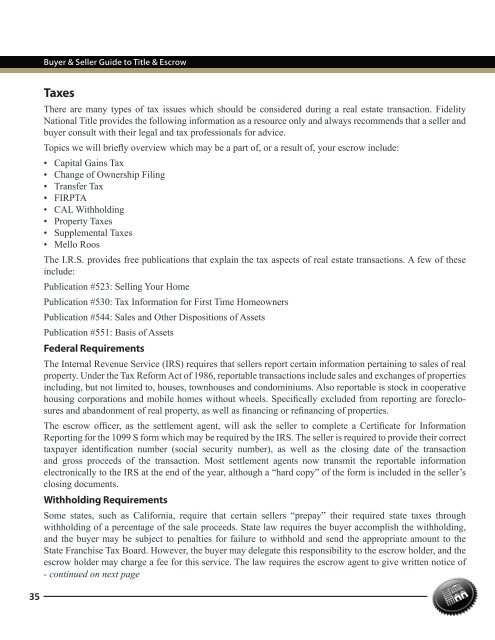Buyer & Seller Guide - Fidelity National Title
Buyer & Seller Guide - Fidelity National Title
Buyer & Seller Guide - Fidelity National Title
Create successful ePaper yourself
Turn your PDF publications into a flip-book with our unique Google optimized e-Paper software.
35<br />
<strong>Buyer</strong> & <strong>Seller</strong> <strong>Guide</strong> to <strong>Title</strong> & Escrow<br />
Taxes<br />
There are many types of tax issues which should be considered during a real estate transaction. <strong>Fidelity</strong><br />
<strong>National</strong> <strong>Title</strong> provides the following information as a resource only and always recommends that a seller and<br />
buyer consult with their legal and tax professionals for advice.<br />
Topics we will briefly overview which may be a part of, or a result of, your escrow include:<br />
• Capital Gains Tax<br />
• Change of Ownership Filing<br />
• Transfer Tax<br />
• FIRPTA<br />
• CAL Withholding<br />
• Property Taxes<br />
• Supplemental Taxes<br />
• Mello Roos<br />
The I.R.S. provides free publications that explain the tax aspects of real estate transactions. A few of these<br />
include:<br />
Publication #523: Selling Your Home<br />
Publication #530: Tax Information for First Time Homeowners<br />
Publication #544: Sales and Other Dispositions of Assets<br />
Publication #551: Basis of Assets<br />
Federal Requirements<br />
The Internal Revenue Service (IRS) requires that sellers report certain information pertaining to sales of real<br />
property. Under the Tax Reform Act of 1986, reportable transactions include sales and exchanges of properties<br />
including, but not limited to, houses, townhouses and condominiums. Also reportable is stock in cooperative<br />
housing corporations and mobile homes without wheels. Specifically excluded from reporting are foreclosures<br />
and abandonment of real property, as well as financing or refinancing of properties.<br />
The escrow officer, as the settlement agent, will ask the seller to complete a Certificate for Information<br />
Reporting for the 1099 S form which may be required by the IRS. The seller is required to provide their correct<br />
taxpayer identification number (social security number), as well as the closing date of the transaction<br />
and gross proceeds of the transaction. Most settlement agents now transmit the reportable information<br />
electronically to the IRS at the end of the year, although a “hard copy” of the form is included in the seller’s<br />
closing documents.<br />
Withholding Requirements<br />
Some states, such as California, require that certain sellers “prepay” their required state taxes through<br />
withholding of a percentage of the sale proceeds. State law requires the buyer accomplish the withholding,<br />
and the buyer may be subject to penalties for failure to withhold and send the appropriate amount to the<br />
State Franchise Tax Board. However, the buyer may delegate this responsibility to the escrow holder, and the<br />
escrow holder may charge a fee for this service. The law requires the escrow agent to give written notice of<br />
- continued on next page


